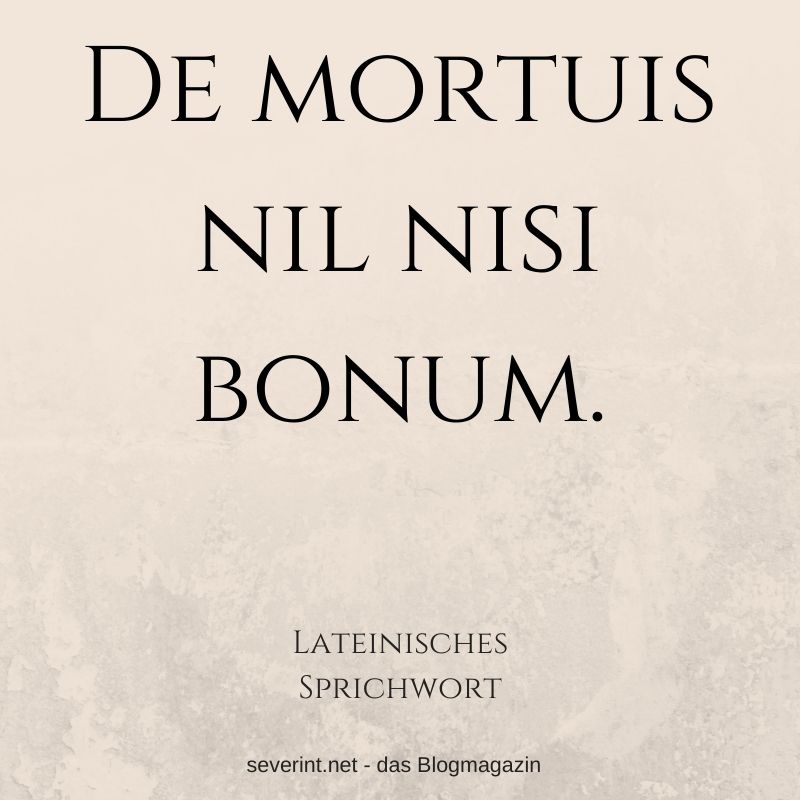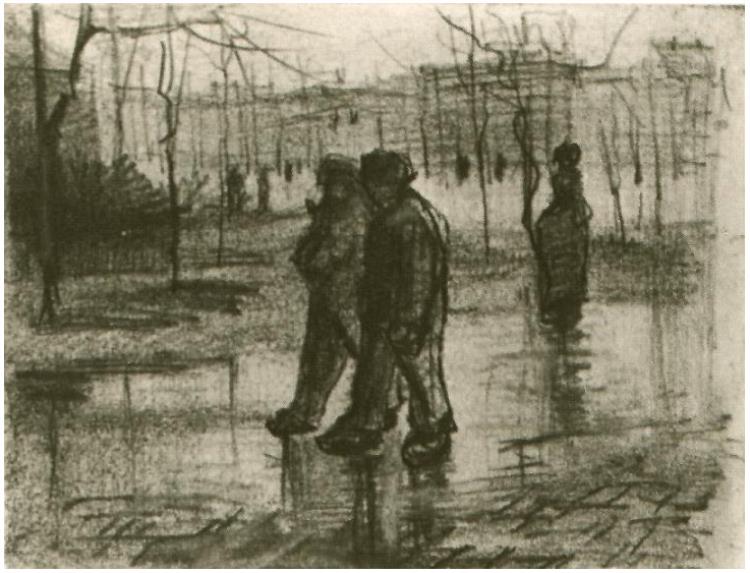
Klangbilder 2019 De mortuis nil nisi bene Teil1 Reinhard Haberfellner
De mortuis nil nisi bene. Tatoeba.org Sentence 1882857. De mortuis resurrexit. Tatoeba.org Sentence 6110704. Dixit ad eas: Ite in domum matris vestræ; faciat Dominus vobiscum misericordiam, sicut fecistis cum mortuis et mecum: det vobis invenire requiem in domibus virorum, quos sortituræ estis.

V48 De Mortuis Nil Nisi...
There's an old, and I guess relatively famous, aphorism "De mortuis nil nisi bene dicendum" ("Of the dead speak nothing but good"). I'm wondering if there are any classical Latin counterpoints or rebuttals to this. In particular I wonder one might something to the effect: "Criticize the departed only with love and noble intentions."

How to pronounce de mortuis nil nisi bonum YouTube
The Latin De mortuis nil nisi bonum, which translates literally as 'About the dead nothing unless (it is) good', is an abbreviation of the maxim De mortuis nil nisi bonum dicendum est (i.e., 'About the dead nothing is to be said unless it is good'). The maxim is sometimes quoted in even more abbreviated forms (simply as De mortuis or as Nil nisi bonum) on the assumption that the person.

Klangbilder 2019 De mortuis nil nisi bene Teil2 Reinhard Haberfellner
nil nisi bonum (about the dead say) nothing unless (it is) good: Short for nil nisi bonum de mortuis dicere. That is, "Don't speak ill of anyone who has died". Also Nil magnum nisi bonum (nothing is great unless good), motto of St Catherine's School, Toorak, Pennant Hills High School and Petit Seminaire Higher Secondary School. nil nisi malis.

Feuilleton. De mortuis nil nisi bonum...
Mathijsen, Marita. "De mortuis nil nisi bene The Influence of Romantic Friendship on the Genesis of Some Nineteenth-Century Publications" In Produktion und Kontext: Beiträge der Internationalen Fachtagung der Arbeitsgemeinschaft für germanistische Edition im Constantijn Huygens Instituut, Den Haag, 4. bis 7.März 1998 edited by H.T.M. van Vliet, 237-244.

De mortuis nihil nisi bene Náboženský infoservis
The Latin phrase De mortuis nil nisi bonum dicendum est, "Of the dead nothing but good is to be said." — abbreviated Nil nisi bonum — is a mortuary aphorism indicating that it is socially inappropriate for the living to speak ill of the dead who cannot defend or justify themselves. The full Latin sentence usually is abbreviated into the.

Lateinisches Sprichwort De mortuis nil nisi bonum
The Latin phrase De mortuis nil nisi bonum dicendum est, "Of the dead nothing but good is to be said." — abbreviated Nil nisi bonum — is a mortuary aphorism indicating that it is socially inappropriate for the living to speak ill of the dead who cannot defend or justify themselves. Chilon of Sparta coined the phrase τὸν.

De Mortuis Nil Nisi Bona Being a Series of Problems by Pegler, Spicer Nils, Problem, Bona
The character Shamrayev conflates it with the phrase de mortuis nil nisi bonum (in the alternative form: de mortuis, aut bene aut nihil: "of the dead, either [speak] good or [say] nothing"), resulting in "de gustibus aut bene, aut nihil", "Let nothing be said of taste but what is good." See also. List of Latin phrases; References

DE MORTUIS NIL NISI BENE
Abstract. In the development of the new nuclear model, Haas worked closely with scientists from the University of Chicago. After a meeting in Chicago, where he had presented a talk on his latest results, he collapsed on the stairs of the conference hotel. He never recovered. Download chapter PDF. Arthur Erich Haas died unexpectedly.

De mortuis nil nisi bene Amagi Radio
The meaning of DE MORTUIS NIL NISI BONUM is of the dead, (say) nothing but good.

Klangbilder 2019 De mortuis nil nisi bene Teil1 Reinhard Haberfellner
De mortuis nil nisi bene. As I ask myself how Erwin Panofsky would react to this choice of motto, I can hear his voice saying, "But, Bill, that doesn't mean that you have to con-fine yourself only to good things in speaking about me; if that were the case, we would have to say De mortuis nil nisi bonum. The adverb bene in this context simply means,

De Mortui Nil Nisi Bene YouTube
De Mortuis Nili Nisi Bene. Posted by Kristine Smets 6 Comments on De Mortuis Nili Nisi Bene. Of the dead (say) nothing but good. The custom of distributing death memorial cards during Roman-Catholic funeral services dates back to the seventeenth century. At first they were handwritten, but during the early nineteenth century printed cards.

de Mortuis Nil Nisi Bona 9781331961420 Spicer Pegler Boeken bol
De mortuis nil nisi bonum explained. The Latin phrase Latin: mortuis nihil nisi bonum (also Latin: De mortuis nil nisi bene [dicendum]) "Of the dead, [say] nothing but good", abbreviated as Latin: Nil nisi bonum, is a mortuary aphorism, indicating that it is socially inappropriate to speak ill of the dead as they are unable to justify themselves.

De mortuis nihil nisi bene Náboženský infoservis
De Mortuis Nil Nisi Hebraice? 51 same time an impressive continuity. Nearly everything appearing in eleventh- and twelfth-century inscriptions, both the more formulaic and the freely composed phrases, as well as some much older elements, was used and reused in constantly varying and geographically dispersed contexts throughout the following.

De mortuis nil nisi bonum 11 oz Ceramic Mug De mortuis nil nisi bonum Mugs CafePress
The character Shamrayev conflates it with the phrase de mortuis nil nisi bonum (in the alternative form: de mortuis, aut bene aut nihil: "of the dead, either [speak] good or [say] nothing"), resulting in "de gustibus aut bene, aut nihil", "Let nothing be said of taste but what is good." [4] See also. List of Latin phrases; Related Research Articles

De Mortui Nil Nisi Bene YouTube
De mortuis nil nisi bonum is a Latin phrase that means speak no ill of the dead. However, common law principle dictates that defaming a deceased person is not actionable. A legal representative or heir of a deceased person approach a court for defamation of a dead person. The legal meaning is contradictory to the colloquial meaning that says it.
- Ibis Hotel City Centre Den Haag
- Wie Speelt Ken In Barbie
- Caracteristica De Sociedad De Responsabilidad Limitada
- Ds G A Van Den Brink
- Waarom Moest Gaby Uit De Jungle
- Jan Van Der Plas Cello
- High Context Culture Low Context Culture
- 150 000 Miles In Km
- 91 Degrees Fahrenheit To Celsius
- Cocker Spaniel Golden Retriever Mix